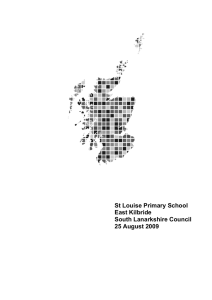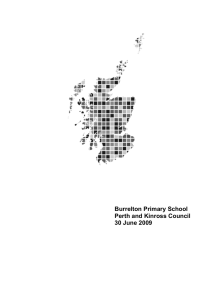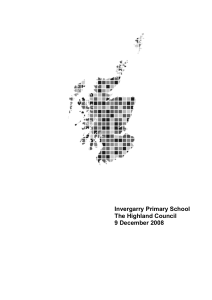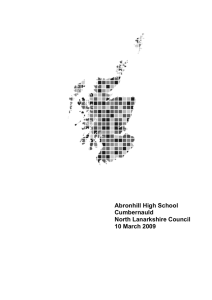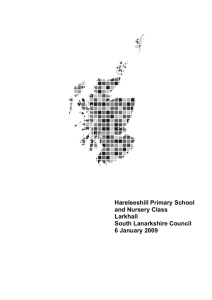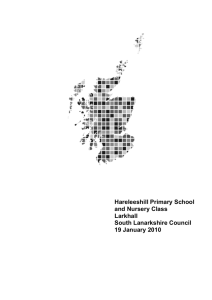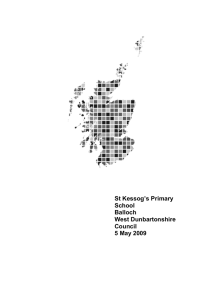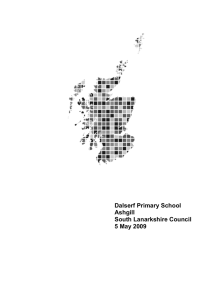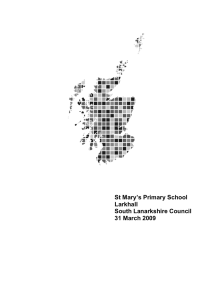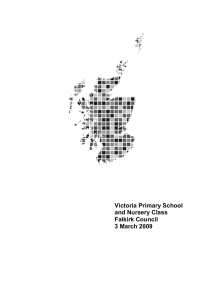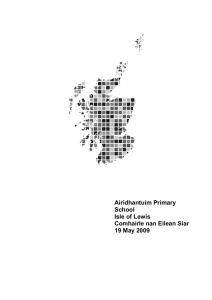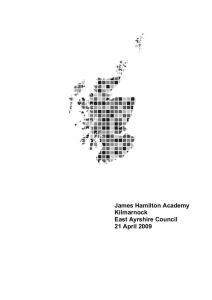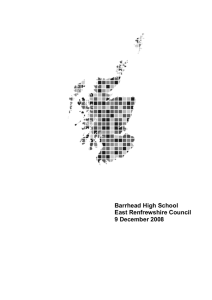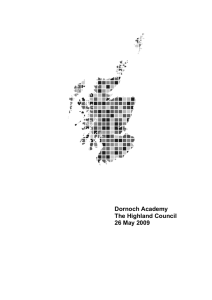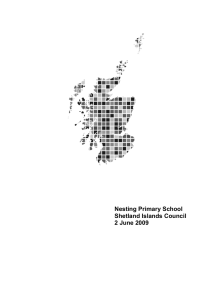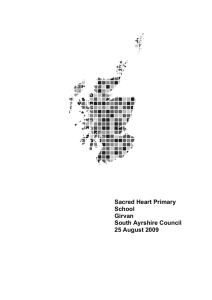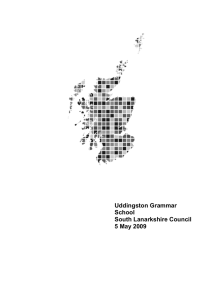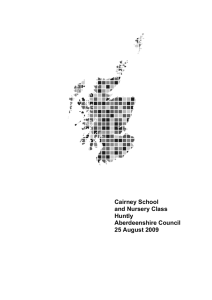Wallace Hall Primary School Thornhill
advertisement
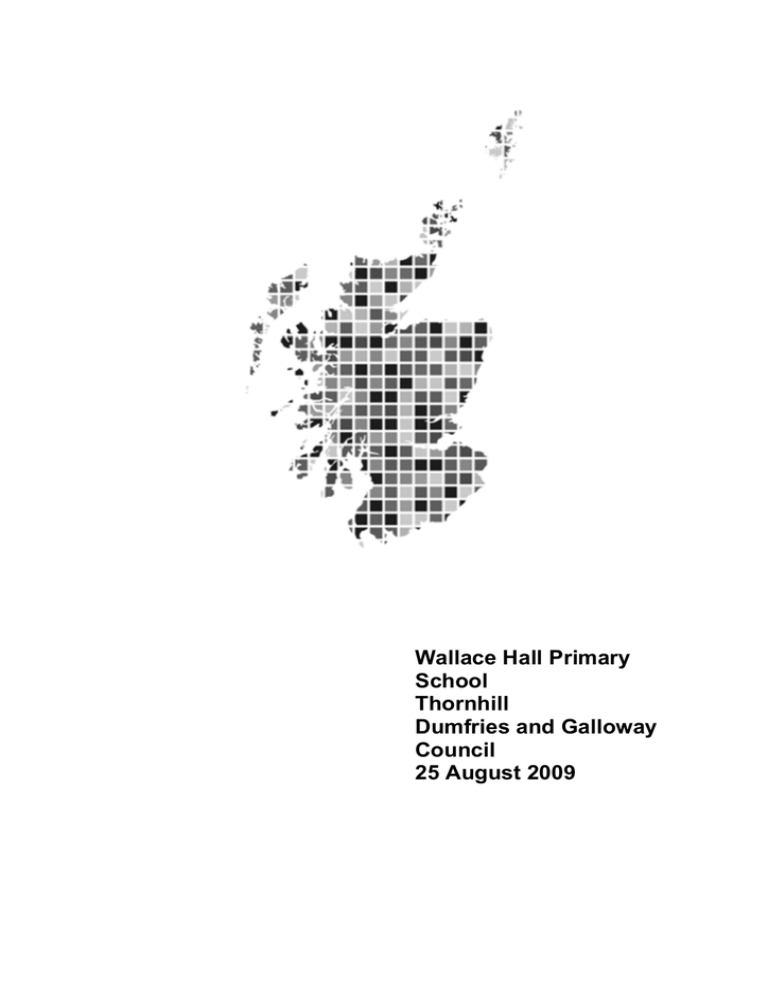
Wallace Hall Primary School Thornhill Dumfries and Galloway Council 25 August 2009 This report tells you about the quality of education at the school1. We describe how children benefit from learning there. We explain how well they are doing and how good the school is at helping them to learn. Then we look at the ways in which the school does this. We describe how well the school works with other groups in the community, including parents2 and services which support children. We also comment on how well staff and children work together and how they go about improving the school. Our report describes the ‘ethos’ of the school. By ‘ethos’ we mean the relationships in the school, how well children are cared for and treated and how much is expected of them in all aspects of school life. Finally, we comment on the school’s aims. In particular, we focus on how well the aims help staff to deliver high quality learning, and the impact of leadership on the school’s success in achieving these aims. If you would like to learn more about our inspection of the school, please visit www.hmie.gov.uk. Here you can find analyses of questionnaire returns. Where applicable, you will also be able to find descriptions of good practice in the school. 1 2 The term ‘school’ is used to include the work of the nursery class, where relevant. Throughout this report, the term ‘parents’ should be taken to include foster carers, residential care staff and carers who are relatives or friends. Contents 1. The school 2. Particular strengths of the school 3. How well do children learn and achieve? 4. How well do staff work with others to support children’s learning? 5. Are staff and children actively involved in improving their school community? 6. Does the school have high expectations of all children? 7. Does the school have a clear sense of direction? 8. What happens next? 1. The school Wallace Hall Primary School is a non-denominational school. It serves the town of Thornhill and surrounding rural area. The roll was 154 when the inspection was carried out in June 2009. Children’s attendance was above the national average in 2007/2008. The school uses accommodation within Wallace Hall Academy for physical education and assemblies. A new joint campus building is being built next to the existing school. 1 2. Particular strengths of the school • Children’s attitudes to and enthusiasm for their learning and wider achievements. • Well-considered approaches to meeting children’s learning needs. • Examples of innovative learning and teaching to take forward a Curriculum for Excellence. • Use of self-evaluation to improve the work of the school led by the headteacher. 3. How well do children learn and achieve? Learning and achievement All children are enthusiastic and proud of their achievements. They learn well by being actively involved in tasks which encourage them to think for themselves. Almost all children are aware of their progress and how to improve their work. Children often work together in pairs and groups and make helpful comments about others’ work. Across all classes, children use information and communications technology (ICT) very well as an important part of their learning activities. For example, children at P7 have created their own movies using animation and sound in a successful media topic on Hollywood. Children at P2 are successfully learning about different homes in their topic work. At P5 children know about the structure of plants and leaves and can sort them by different types. Children in the upper stages are very aware of energy conservation. Children are gaining responsibility and increasing their active citizenship skills by taking part in a variety of charity events and collections. They achieve well through their involvement in after school clubs and lunchtime activities. 2 Children at P7 responded well to the challenging activities at the recent residential experience in York. Attainment levels in reading, writing and mathematics have varied a little over the last two years. Most children are attaining appropriate national levels in listening, talking, reading, writing and mathematics. A few children are achieving national levels earlier than expected. All children are making good progress in their learning in English language. Children listen well to their teachers, contribute well to discussions and speak confidently in class. At P1 to P3, children are becoming more fluent in their reading. From P4 to P7, children are developing a lively interest in books. Children write for a range of purposes and do so particularly well in their topic work. At times, children need to remember to use punctuation and present their work more neatly. In mathematics, children are quick at mental calculations and are accurate in their written work. At P1, children enjoy adding and sequencing numbers in practical activities. At P3 and P4, children can explain confidently grid references and how to make graphs and simple spreadsheets using ICT. Almost all children have appropriate problem-solving skills. They experience active and stimulating problem-solving activities and can relate these to everyday situations. Curriculum and meeting learning needs Across the school staff have made a positive start to the implementation of national guidance Curriculum for Excellence. Teachers help children apply their skills across curriculum areas. For example staff extend children’s understanding of health and wellbeing and social studies while developing their literacy and numeracy skills. Staff help children see the relevance of their learning by visiting local places of interest and producing information leaflets. Education about the environment includes work towards an Eco-Schools Scotland award and activities in the school garden. The programme, “Seasons for Growth”, helps children cope with difficult personal situations. The school provides a variety of sports activities organised by the Active Schools coordinator. The school is working towards providing children with two hours quality physical education each week. 3 Across the school, tasks and learning activities are appropriate and motivating for almost all children. Staff are consistent and effective in the way in which they support children who need extra help with their learning. The learning support teacher consults appropriately and works successfully with children, staff and parents to meet the learning needs of individuals. Learning assistants provide well-targeted help within classes. Staff meet regularly to review targets for children’s learning. This ensures that children are making good progress. Staff use a variety of questions and approaches to develop children’s learning. They use feedback consistently well to help children improve. Children have regular and varied homework. 4. How well do staff work with others to support children’s learning? Staff have formed helpful partnerships with agencies and individuals outside the school to help all children progress in their learning. The Parent Council provides good support and is working with staff to improve progress reports for parents. Children with their parents take part in activities to encourage healthy lifestyles. Staff in school consult parents about sensitive issues. The school deals appropriately with complaints. Children about to start P1 take part in a well planned induction programme to help them settle into school. Children at P7 are supported well by the school’s “Moving On” programme when transferring to Wallace Hall Academy. 5. Are staff and children actively involved in improving their school community? Children enjoy taking responsibility across the school. Almost all are developing a sense of citizenship and speak enthusiastically about taking part in the pupil council and the health and eco club. Children at P6 enjoy being part of the paired reading scheme with P2 and acting as playground buddies for younger children. The headteacher has encouraged staff to visit other classes to learn from each other. 4 His strong focus on self-evaluation is helping staff to improve teaching and learning. The headteacher and staff need to collect information on children’s attainment more thoroughly to track and support their progress. The headteacher and staff have identified those areas where further improvements are needed. Staff have used the school improvement plan to help them to take forward Curriculum for Excellence. 6. Does the school have high expectations of all children? Children are proud of their school. Children, parents and staff have recently helped to decide the school’s vision and values. Children welcome visitors warmly and are keen to share their achievements. Older children have created a target system to help measure their progress and successes in reading. Children are well behaved and courteous to each other and staff. They feel they can share their concerns if they are worried or upset. Staff treat all children fairly and equally, and develop their understanding of different cultures. There are appropriate opportunities for religious observance. Staff use regular assemblies and attractive wall displays to celebrate children’s achievements both within and outwith the school. All staff have an appropriate awareness of child protection procedures. Office staff are vigilant in taking appropriate action if children are absent from school without explanation. 7. Does the school have a clear sense of direction? The headteacher has a clear sense of direction. He has correctly identified areas for improvement in the school and takes a strong lead in curriculum development. He has focussed on improving the quality of learning experiences. The principal teacher carries out her work effectively and is a good support to all staff. Staff work very well to improve the school. They are increasingly successful in evaluating their own practice and in adapting their teaching to improve learning for children. The school is well placed to continue to improve. 5 8. What happens next? The school’s self-evaluation is leading to improvements in children’s learning. As a result, the inspection team was able to change its focus during the inspection to help the school plan to improve even more. The school provides a very good quality of education. Therefore we will make no further visits following this inspection. The education authority will inform parents about the school’s progress as part of the authority’s arrangements for reporting to parents on the quality of its schools. We have agreed the following area for improvement with the school and education authority. • Continue to improve the tracking of children’s progress. 6 Quality indicators help schools and nursery classes, education authorities and inspectors to judge what is good and what needs to be improved in the work of a school and a nursery class. You can find these quality indicators in the HMIE publications How good is our school? and The Child at the Centre. Following the inspection of each school, the Scottish Government gathers evaluations of three important quality indicators to keep track of how well all Scottish schools and nursery classes are doing. Here are the evaluations for Wallace Hall Primary School Improvements in performance Learners’ experiences Meeting learning needs good very good very good We also evaluated the following aspects of the work of the school. The curriculum Improvement through self-evaluation HM Inspector: Elizabeth Paterson 25 August 2009 7 very good very good To find out more about inspections or get an electronic copy of this report go to www.hmie.gov.uk. Please contact the Business Management and Communications Team (BMCT) if you wish to enquire about our arrangements for translated or other appropriate versions. If you wish to comment about any of our inspections, contact us at HMIEenquiries@hmie.gsi.gov.uk or alternatively you should write in the first instance to BMCT, HM Inspectorate of Education, Denholm House, Almondvale Business Park, Almondvale Way, Livingston EH54 6GA. Our complaints procedure is available from our website www.hmie.gov.uk or alternatively you can write to our Complaints Manager, at the address above or by telephoning 01506 600259. If you are not satisfied with the action we have taken at the end of our complaints procedure, you can raise your complaint with the Scottish Public Services Ombudsman (SPSO). The SPSO is fully independent and has powers to investigate complaints about Government departments and agencies. You should write to SPSO, Freepost EH641, Edinburgh EH3 0BR. You can also telephone 0800 377 7330, fax 0800 377 7331 or e-mail: ask@spso.org.uk. More information about the Ombudsman’s office can be obtained from the website at www.spso.org.uk. This report uses the following word scale to make clear judgements made by inspectors. excellent very good good satisfactory weak unsatisfactory outstanding, sector leading major strengths important strengths with some areas for improvement strengths just outweigh weaknesses important weaknesses major weaknesses Crown Copyright 2009 HM Inspectorate of Education
